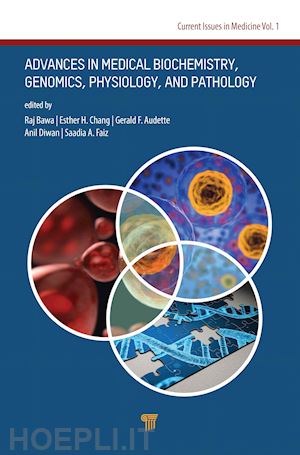1. The Age of COVID-19: Medical Facts and Fiction Raj Bawa, MS, PhD, MD'22 Section 1: Medical Biochemistry and Genomics 2. Role of Engineered Proteins as Therapeutic Formulations Khushboo Gulati, PhD, and Krishna Mohan Poluri, PhD 3. How Physical and Chemical Information Predicts the Action of Molecules: A Historical Overview Myron L. Toews, PhD, JoEllyn M. McMillan, PhD, and David B. Bylund, PhD 4. Three-Dimensional Chromatin in Infectious Disease: A Role for Gene Regulation and Pathogenicity? Sage Z. Davis, PhD, Thomas Hollin, PhD, Todd Lenz, and Karine G. Le Roch, PhD 5. Aptamers, the Nucleic Acid Antibodies, in Cancer Therapy Zhaoying Fu, PhD, and Jim Xiang, PhD 6. Identifying Genetic Markers Associated with Susceptibility to Cardiovascular Diseases Hitesh Shukla, MSc, Jessica Louise Mason, MSc, and Abdullah Sabyah, MBBS, MSc 7. Production and Application of Multicistronic Constructs for Various Human Disease Therapies Alisa A. Shaimardanova, Daria S. Chulpanova, Kristina V. Kitaeva, Ilmira I. Abdrakhmanova, Vladislav M. Chernov, DSc, Catrin S. Rutland, PhD, Albert A. Rizvanov, DSc, and Valeriya V. Solovyeva, PhD 8. The Nuclear Lamina: Protein Accumulation and Disease Carla Almendáriz-Palacios, MSc, Zoe E. Gillespie, MSc, Matthew Janzen, Valeria Martinez, Joanna M. Bridger, PhD, Troy A. A. Harkness, PhD, Darrell D. Mousseau, PhD, and Christopher H. Eskiw, PhD 9. The Importance of Protein Post-Translational Modifications in the Pathogenesis and Progression of Neurodegenerative Diseases Larissa-Nele Schaffert and Wayne G. Carter, PhD 10. DNA Damage/Repair Management in Cancers Jehad F. Alhmoud, PhD, John F. Woolley, PhD, Ala-Eddin Al Moustafa, PhD, and Mohammed Imad Malki, MD, PhD 11. Advancing Clinical Cohort Selection with Genomics Analysis on a Distributed Platform Jaclyn M. Smith, MSc, Melvin Lathara, MSc, Hollis Wright, PhD, Nalini Ganapati, MSc, Ganapati Srinivasa, MSc, and Christopher T. Denny, MD 12. Pharmacogenomics of Tamoxifen Hitoshi Zembutsu, MD, PhD 13. Nanocrystals: The Universal Formulation Principle to Improve the Bioactivity of Poorly Soluble Actives Ralph W. Eckert, Steffen F. Hartmann, Daniel Knoth, Olga Pelikh, Rainer H. Müller, PhD, and Cornelia M. Keck, PhD 14. Cellular Mechanisms of Human Atherogenesis: Focus on Chronification of Inflammation and Mitochondrial Mutations Alexander M. Markin, PhD, Igor A. Sobenin, MD, PhD, Andrey V. Grechko, PhD, Dongwei Zhang, PhD, and Alexander N. Orkhov, PhD 15. Vitamin D Pathway and the Pathogenesis of Inflammatory Bowel Disease Stefano Nobile, PhD, Michela A. Tenace, RN, and Helen M. Pappa, PhD 16. The Structural Ensemble of the Conjugative F-like T4SS Nicholas Bragagnolo, MSc, Christina Rodriguez, and Gerald F. Audette, PhD 17. Polygenic Risk-Tailored Screening for Prostate Cancer: A Benefit–Harm and Cost-Effectiveness Modelling Study Tom Callender, MBChB, MSc, Mark Emberton, MBBS, MD, Steve Morris, PhD, Ros Eeles, MBBS, PhD, Zsofia Kote-Jarai, PhD, Paul D. P. Pharoah, BM BCh, PhD, and Nora Pashayan, MD, PhD 18. Apoptotic Bodies: Particular Extracellular Vesicles Involved in Intercellular Communication Michela Battistelli, PhD, and Elisabetta Falcieri, MD Section 2: Human Physiology and Pathology 19. Circulating Tumor Cells and Personalized Medicine Jin Sun Lee, MD, Mark Jesus M. Magbanua, PhD, Marc R. Jabon, MD, and John W. Park, MD 20. Pathology in the Era of Personalized Medicine Hye Seung Lee, MD, PhD 21. Speech Intelligibility during Clinical and Low Frequency John J. Sidtis, PhD, Diana Van Lancker Sidtis, PhD, Ritesh Ramdhani, MD, and Michele Tagliati, MD 22. Physiological Renormalization Using Systems Therapeutics Greg Maguire, PhD 23. Pathology Is Always Around Us: Apophenia in Pathology, a Remarkable Unreported Phenomenon Ahmed S. Sultan, BDS, PhD, and Maryam Jessri, DDS, PhD 24. The Secrets of the Mediterranean Diet. Does [Only] Olive Oil Matter? Alessandra Mazzocchi, PhD, Ludovica Leone, PhD, Carlo Agostoni, PhD, and Isabella Pali-Schöll, PhD 25. Relationship between Diet, Microbiota, and Healthy Aging Juan Gambini, PhD, Elisa Sanchez-Morate, MSc, Lucia Gimeno-Mallench, PhD, Kristine Stromsnes, MSc, Jorge Sanz-Ros, Aurora Román-Domínguez, MSc, Sergi Parejo-Pedrajas, MSc, Marta Inglés, PhD, Gloria Olaso, PhD, and Cristina Mas-Bargues, PhD 26. Does Low-Density Lipoprotein Cholesterol Induce Inflammation? If So, Does It Matter? Current Insights and Future Perspectives for Novel Therapies Ruurt A. Jukema, MSc, Tarek A. N. Ahmed, MD, PhD, and Jean-Claude Tardif, MD 27. Role of Biomarkers in Clinical Development of Cancer Therapies Helen X. Chen, MD 28. In Sickness and Health: Effects of Gut Microbial Metabolites on Human Physiology Robert W. P. Glowacki, PhD, and Eric C. Martens, PhD 29. Current Methodologies Utilized in the Conduct of Randomized Clinical Trials Marina A. Malikova, MSci, MA, PhD 30. The Prion-Like Phenomenon in Alzheimer’s Disease: Evidence of Pathology Transmission in Humans Ruben Gomez-Gutierrez, PhD, and Rodrigo Morales, PhD












